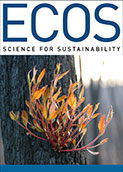
|
Published: 18 August 2014
P on the pods
Urine could be successfully recycled to fertilise crops according to University of Sydney researchers, who have examined the effectiveness of reusing nutrients from human waste.

|
|
Unless we find alternative sources of phosphorus or other nutrients, the world could run out of these natural resources. Credit:
FLickr/Tico CC BY-NC-ND 2.0
|
The university’s Dr Federico Maggi says there is growing evidence that the use of human urine in agriculture is completely viable.
‘Our preliminary results indicate that human urine can be effectively used extensively in agriculture to reduce the production and use of mineral commercial fertilisers.
‘It contains the highest levels of nutrients among all the human excreta and yields considerable amounts of nitrogen, phosphorus and potassium. These are the most essential nutrients for the growth of plants, and substantially all micronutrients plants need for healthy growth.’
The researchers believe the model they have developed could be used to increase the effectiveness of urine fertilisation as well as crop yield, substantially lowering costs in terms of supplied nutrient.
According to PhD student, Fiona Tang, human urine contains ‘complex compounds that can be broken down into simpler molecules that plants and crops actually want to take up as their food source’.
‘Soybean, cabbage and cauliflower, for example, flourish with it,’ she adds.
Fiona previously conducted a survey investigating attitudes towards the use of human urine as a substitution to mineral fertiliser. She found a high acceptance level to its application in agriculture.
‘Human waste has been used as organic fertiliser since ancient times. Its use in agriculture is still commonly practiced in many areas around the world, including parts of Southeast Asia and Africa,’ she says.
‘Over 70 per cent of the respondents in the survey were very positive towards the idea of applying human urine in agriculture and were willing to buy and consume crops grown by urine-based fertiliser.’
Ms Tang warns that unless we find alternatives to phosphorus or a similar mineral, the world will potentially run out of these natural resources.
‘Extensive reliance on mineral fertiliser is consuming copious amounts of fossil energy and mineral resources.
‘Phosphorus, especially, is depleting and some studies have revealed the reserves of phosphate rock that are economically exploitable will only last for about 100 years at current extraction rates.
‘Recycling nutrients from human urine is a promising solution to the depletion of mineral resources.’
The research supports the use of toilet systems that separate human waste at the point of deposit.
‘Years ago society baulked at the idea of separating their household waste into recyclable and non-recyclable bins, now in Australia it is second nature,’ states Dr Maggi.
Source: The University of Sydney



